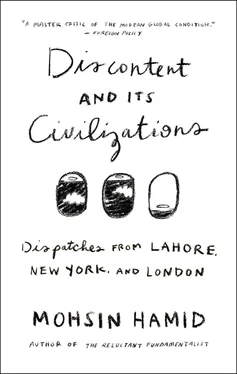Pakistan now has private television stations that refuse to let the government set the news agenda. It has a Supreme Court that has asserted its independence for the first time, restoring a chief justice suspended by the president. And it has an army under physical attack from within and in desperate need of compromise with civil society.
A sixtieth birthday brings with it the obligation to shed some illusions. Pakistanis must realize that we have been our own worst enemies. My wish for our national anniversary is this: that we finally take the knife we have turned too often upon ourselves and place it firmly in its sheath.
(2007)
IN CONSIDERING President Obama’s speech in Cairo, it is worth bearing in mind a simple truth: no human being is only a Muslim and no human being is only an American. The people one might call Muslims, or Americans, are also women and men; mothers, fathers, daughters, and sons; lovers and doctors and writers and schoolteachers; poor and wealthy; politically engaged and apathetic; sure in their beliefs and utterly uncertain. They are, in other words, complex, multidimensional, unique, and ever changing. Look closely at the solid mass called Muslims and you will see a cloud of a billion individual atoms.
Religion and nationality are but two of the myriad dimensions along which our personal identities are constructed. As human beings, we realize that instinctively. When someone holds open a closing door so we can board an elevator, the component of their identity we value is not that they are Muslim, or American, but rather that they are compassionate. It is when we are frightened, and especially when our fears are played up and redirected and preyed upon, that we tend to reduce others to simplified (and artificial) mono-identities of religion or nationality or race.
President Obama’s speech was a welcome attempt to diminish our fear of one another. He said that Muslims and Americans overlap in seven million Muslim-American citizens, in centuries of shared history, and indeed in President Obama’s own family. He drew attention to similarities between the Muslim, Christian, and Jewish faiths. He stood up against crude stereotyping. He rejected the notion that Islam and the United States are in competition. He called for mutual respect, greater engagement, and more openness.
His speech was a promising beginning, a hopeful departure from the terrifying character of the previous United States administration. But in order for the speech to be more than a beginning, it will need to be followed by actions. As a novelist, I hold words in high regard, and I am grateful for many of the words I heard President Obama say. Such a dramatic change in tone can make deeds previously impossible possible. But those deeds will determine how President Obama’s speech is judged by history.
There are reasons for optimism. The passage of the speech that has stayed with me most is: “The United States does not accept the legitimacy of continued Israeli settlements.” It is becoming increasingly evident that President Obama intends to bring substantial pressure on Israel to reach a lasting peace with the Palestinians. Words such as these, coupled with actions, have the potential to improve the lives of millions.
Similarly, the withdrawal of American soldiers from Iraq, the closing of the detention camp at Guantánamo Bay, and the disavowal of the use of torture were all real promises of change, and they gave the speech added weight, even if they had of course already been announced.
But other passages of the speech, for example on democracy, seemed to run counter to President Obama’s own actions. Saudi Arabia and Egypt, among America’s closest allies in the region, are resolutely undemocratic nations. Similarly, to speak of “preventing a nuclear arms race in the Middle East” as something ignited by Iran, without mentioning Israel’s deployment of nuclear weapons, was disingenuous.
It is in these lapses that President Obama’s challenge becomes clear. I think he is an exceptional man. I believe the world is fortunate to have him as president of the United States. But in the end, it is not possible to champion national greatness and human equality at the same time. Either the value placed on the life of an Iraqi or a Pakistani is equal to the value placed on the life of an American, or it is not. Either the value placed on the life of a Palestinian is equal to the value placed on the life of an Israeli, or it is not.
The United States needs to address this contradiction. It seeks to stand for national greatness and human equality. Yet its greatness is in part built upon the denial of the equality of others outside its borders. That denial stems from an emphasis being placed on one aspect of human identity, nationality, and it invites responses that similarly emphasize one aspect of human identity, such as religion.
Barack Hussein Obama has been elected president of the United States, not president of some world government. But his morality must be rooted primarily in his humanity, not in his office. His speech suggested that on the continuum between national greatness and human equality he stands closer to equality than did his predecessor. That is reason to celebrate. But I suspect most non-American Muslims, like most non-American non-Muslims, will hope that when President Obama said, “We do unto others as we would have them do unto us,” he recognized the extraordinary magnitude of the shift in policies such a credo would require.
(2009)
WHY ARE AHMADIS persecuted so ferociously in Pakistan?
The reason can’t be that their large numbers pose some sort of “threat from within.” After all, Ahmadis are a relatively small minority in Pakistan. They make up somewhere between 0.25 percent (according to the last census) and 2.5 percent (according to The Economist ) of our population.
Nor can the reason be that Ahmadis are non-Muslims. Pakistani Christians and Pakistani Hindus are non-Muslims, and similar in numbers to Pakistani Ahmadis. Yet Christians and Hindus, while undeniably discriminated against, face nothing like the vitriol directed toward Ahmadis in our country.
To understand what the persecution of Ahmadis achieves, we have to see how it works. Its first step is to say that Ahmadis are non-Muslims. And its second is to say that Ahmadis are not just non-Muslims but apostates: non-Muslims who claim to be Muslims while rejecting core tenets of Islam. These two steps are easy to take: any individual can choose to believe whatever they want about Ahmadis and their faith.
But the process goes further. Step three is to say that because Ahmadis are apostates, they should be victimized, or even killed. We are now beyond the realm of personal opinion. We are in the realm of group punishment and incitement to murder. Nor does it stop here. There is a fourth step. And step four is this: any Muslims who say Ahmadis should not be victimized or killed should themselves be victimized or killed.
In other words, even if they are not themselves Ahmadi, any policeman, doctor, politician, or passerby who tries to prevent, or just publicly opposes, the killing of an Ahmadi deserves to die. Why? Because people who defend apostates are apostates.
Aha.
This is what the persecution of Ahmadis achieves. It allows any Muslim to be declared an apostate. For the logic can be continued endlessly. When an Ahmadi man is wounded in an attack and goes to a hospital for treatment, if the doctor agrees to treat him, she is helping an apostate, and therefore she becomes an apostate and subject to threats. When a policeman is deputed to protect the doctor, since she is an apostate, the policeman is helping an apostate, so he, too, becomes an apostate. And on and on.
Читать дальше












